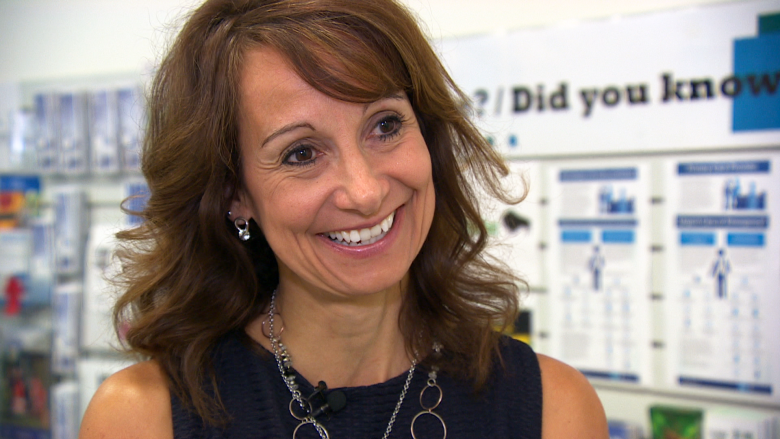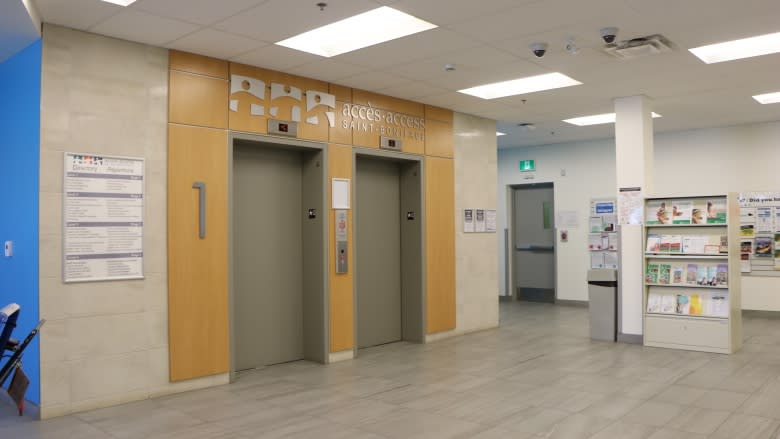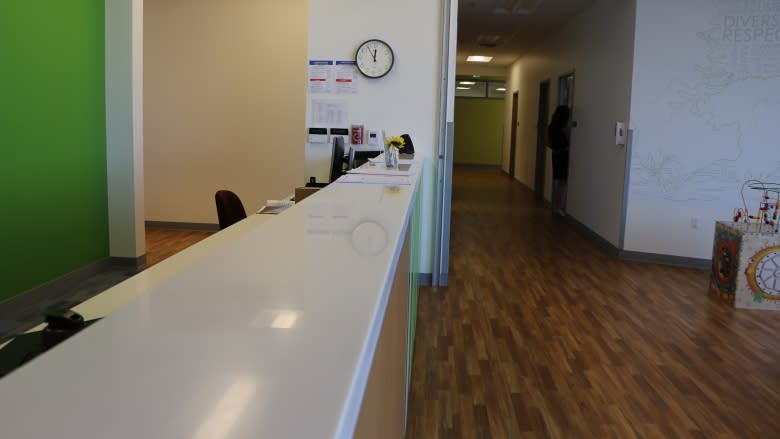Do you know what an Access centre is? Because soon you may need to
A couple of people sit at desks while information pamphlets are carefully placed in containers near a wall across the bright room just through the main doors of the Access centre in St. Boniface.
The doors will swing open for thousands more Winnipeggers as the centre starts to act as a QuickCare clinic at the start of 2018.
All but one of the city's QuickCare clinics will be closed as the Winnipeg Regional Health Authority works toward reaching provincially mandated budget cuts. At the same time, clinic hours at the city's Access centres will be extended to accommodate patients.
The QuickCare clinics on Vermillion Road, Portage Avenue, Jefferson Avenue and Dakota Street will close, and their services will be redirected to other primary care options in the surrounding areas by the end of January 2018, the health authority announced earlier this month.
The Access centre in St. Boniface, a 50,000-square-foot building located at 170 Goulet St. that officially opened in April 2016, is preparing to take in QuickCare patients.
A lot of people might not know what an Access centre is, let alone what it will mean once they start taking patients who otherwise would have gone to a QuickCare clinic, said Monique Constant, community area director for health and social services for St. Boniface and St. Vital and executive director of Centre de santé, the primary care clinic in the Access centre.
"The Access centre is the hub of health and social services," she told CBC News. "So we have various departments and various services that are offered here."
Each brightly lit and freshly painted floor of the St. Boniface Access centre holds a variety of different services, which helps promote its multi-disciplinary approach to health.
There's the bilingual service centre on the main floor, providing people with information from the city, provincial and federal levels.
Two large elevators bring people up through the different floors and the services provided, but the second floor is where most will be headed. It houses speech pathology for children, home care services for St. Boniface and St. Vital, and the centre's primary care clinic.
A large Centre de santé Saint-Boniface sign sits behind the long intake desk, beside two hallways that have doors that open to about 20 clinic rooms. The spacious waiting room is beside floor-to-ceiling windows. Artwork of the Provencher Bridge is painted on the wall. The doors are frosted glass, and many of the other walls are painted in vibrant colours.
"It does have that fresh-look concept," Constant said.
The current primary care clinic has 11 physicians, two nurse practitioners and five nurses. It serves residents of St. Boniface or anyone in the French-speaking population of Winnipeg.
The Access centre is currently only for at-risk patients who have applied through the province's Family Doctor Finder, although the services that will replace QuickCare clinics will be open to everyone.
"We focus on the health equity lens. We look at the most at-risk clients in our community because of the multidisciplinary team," Constant said.
If a person meets certain criteria — they are on income assistance, need home care or have other complex health needs — they are referred to an Access centre.
Constant said a triage nurse will then go through their health file and if everything checks out they become a client.
St. Boniface Access centre clients also have access to Employment and Income Assistance, community rooms, the Department of Families and a community kitchen on the third floor.
The fourth floor is mostly administration and not for clients.
The St. Boniface Access centre currently treats 7,000 clients who made 22,000 visits to the primary care clinic in the last fiscal year.
Things are set to change as they start offering the services of a QuickCare clinic to people who aren't clients of the full Access centre.
Constant said they are preparing to take in the workload of the Vermillion Road clinic, which means preparing for up to 7,000 more patient visits.
"Right now we are looking at how are we going to divvy up the space within our existing clinic," she said.
"How are we going to make sure that we have the right signage so that those coming for episodic care [what was provided by QuickCare clinics] will be directed to one area of the counter within reception and then our current primary care clients can continue to be serviced separately."
Three rooms will be allocated for the QuickCare services and Constant expects they will be adding a few more chairs to the waiting room. Physically, there will not be a lot of changes to the building, but when it comes to staffing and hours it's a different case.
Constant said they hope to absorb four nurse practitioners, a couple of nurses and about four primary care assistants, who they hope will come from QuickCare clinics.
Once the changes take effect, the QuickCare clinic part of operations will be open from 12-8 p.m., Monday to Friday. Weekend hours are still being looked at.
Constant also emphasized that the QuickCare clinic is open to anyone, not just the Access centre's clients.
While there will be changes coming to the operations of the Access centre, Constant said, people who are used to QuickCare clinics can expect the same level of service, just in a different location.
"Really we are relocating the services and they will not only be relocated in Centre de santé Saint-Boniface but other areas in the city so that they spread nicely equitable," she said.
"I don't think there should be any concerns. It will be the same delivery of service."
Walking down the open hallways of the building, Constant said she understands why people are nervous about the changes — an overhaul of how people get treatment is bound to cause worry.
But she said bringing the QuickCare into the Access clinic setting means people will benefit from the multi-disciplinary approach.
"The QuickCare model staff can work side-by-side with our multi-disciplinary team," she said.
"It will be a more comprehensive care."







